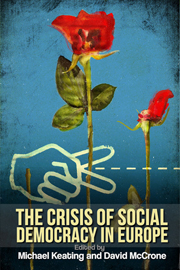Book contents
- Frontmatter
- Contents
- List of tables and figures
- About the contributors
- Preface
- 1 The crisis of social democracy
- 2 The Long Depression, the Great Crash and socialism in Western Europe
- 3 Social democracy in crisis: outlining the trends in Western Europe
- 4 The positions and fortunes of social democratic parties in East Central Europe
- 5 Rethinking public expenditure from a social democratic perspective
- 6 Social democracy in crisis? What crisis?
- 7 Can the Swedish social model survive the decline of the social democrats?
- 8 Multiculturalism, right-wing populism and the crisis of social democracy
- 9 Labour markets, welfare states and the dilemmas of European social democracy
- 10 Class politics and the social investment welfare state
- 11 Labour, skills and education in modern socio-economic development: can there be a social democratic economic and industrial policy in a globalised economy?
- 12 From single market to social market economy: is there room for solidarity?
- 13 Social democracy and security
- 14 Multilevel social democracy: centralisation and decentralisation
- 15 Conclusion
- Bibliography
- Index
6 - Social democracy in crisis? What crisis?
Published online by Cambridge University Press: 05 October 2013
- Frontmatter
- Contents
- List of tables and figures
- About the contributors
- Preface
- 1 The crisis of social democracy
- 2 The Long Depression, the Great Crash and socialism in Western Europe
- 3 Social democracy in crisis: outlining the trends in Western Europe
- 4 The positions and fortunes of social democratic parties in East Central Europe
- 5 Rethinking public expenditure from a social democratic perspective
- 6 Social democracy in crisis? What crisis?
- 7 Can the Swedish social model survive the decline of the social democrats?
- 8 Multiculturalism, right-wing populism and the crisis of social democracy
- 9 Labour markets, welfare states and the dilemmas of European social democracy
- 10 Class politics and the social investment welfare state
- 11 Labour, skills and education in modern socio-economic development: can there be a social democratic economic and industrial policy in a globalised economy?
- 12 From single market to social market economy: is there room for solidarity?
- 13 Social democracy and security
- 14 Multilevel social democracy: centralisation and decentralisation
- 15 Conclusion
- Bibliography
- Index
Summary
Has the social democratic model of society stopped working?
This chapter addresses the following question: can the weakening of the social democratic political project in Europe be explained by the fact the social democratic model of society no longer performs? In other words, can the recent electoral crisis in social democratic parties be seen as a rational response from an electorate saying goodbye to a socio-economic model? If you want to compare social democratic policies with some kind of utopian political programme, you will certainly be disappointed. As pointed out in the introductory chapter to this volume, social democracy was never a utopian political project and its earlier success can therefore not be seen as a result of fulfilling a nirvana type of society. In contrast to the utopian models historically launched by communists and anarchists, social democracy has traditionally been firmly anchored in a concrete, down-to-earth pragmatism based on a realist vision that politics must be based on what is ‘possible’.
Our argument is that the most reasonable way of judging the performance of the social democratic ‘model for society’ is to compare it with other existing macro-models. The most relevant in a European perspective is the centrist Christian democratic model and the political right's neo-liberal model. The questions are these: what should count as success for such macro-models and which countries should be seen as the best representatives of the social democratic model of society? We will start with the latter question.
- Type
- Chapter
- Information
- The Crisis of Social Democracy in Europe , pp. 87 - 106Publisher: Edinburgh University PressPrint publication year: 2013



